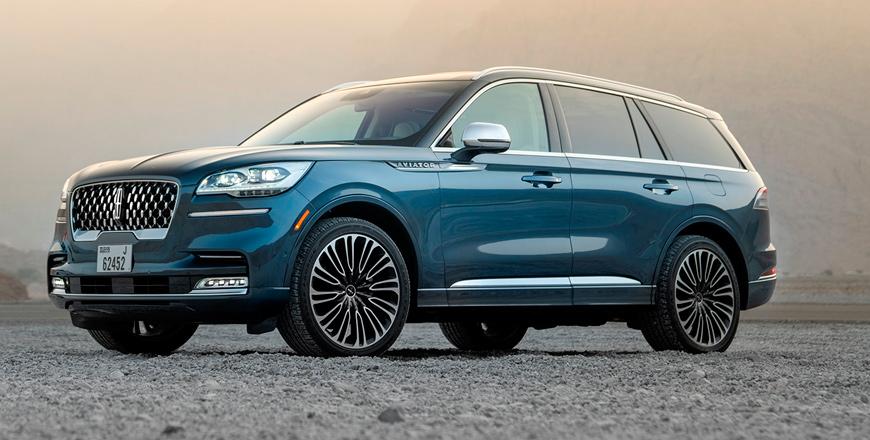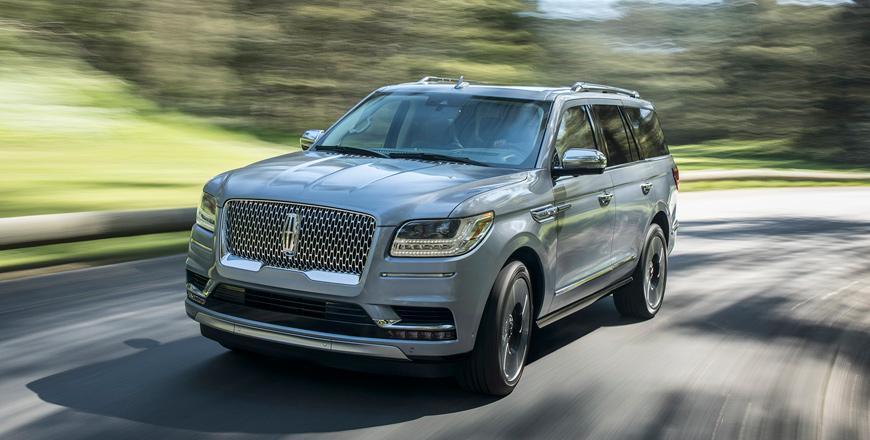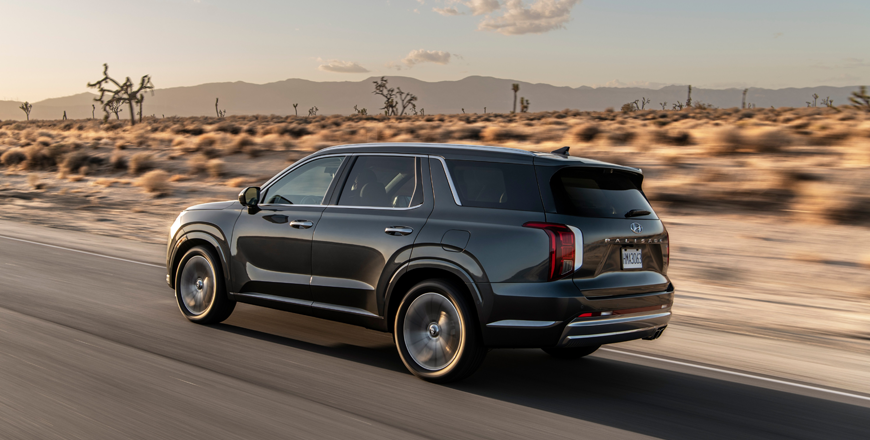You are here
Lincoln Aviator: Luxury highflier
By Ghaith Madadha - Oct 05,2020 - Last updated at Oct 05,2020

Photo courtesy of Lincoln
Launched last year as a 2020 model, the Lincoln Aviator may play second fiddle to hulking full-size Navigator SUV flagship in the American luxury car maker’s model hierarchy, but it is in fact set to become the brand’s most interesting, desirable and rewarding vehicle. Effectively replacing Lincoln’s largely excellent Continental saloon when it is soon discontinued owing to changing consumer habits and Lincoln’s and its Ford parent company’s direction to a more SUV- and crossover-oriented line-up, the Aviator is exactly what a modern American luxury vehicle should be.
Urgent and elegant
Based on the same new rear-drive oriented platform that underpins the current Ford Explorer, the Aviator is a dynamically adept, thoroughly comfortable, highly refined and spaciously practical SUV. Generously equipped with high tech mod cons and safety features, and finished with truly fine quality materials and tasteful design, the Aviator competes with the best Europe has to offer in the mid-size to large SUV segment. That said, it retains a quintessentially American flavour with a powerful posture and plenty of presence that is stylish, glamorous and glitzy rather than brash, brutish or excessive in “bling”.
With a short front overhang, long bonnet and long wheelbase well balanced by a long rear overhang and long, gently descending “floating” roofline, tipped with a jutting tailgate spoiler, the Aviator is among the most perfectly proportioned SUVs in its class. Evocative in its elegant proportions, the Aviator’s body-to-glass ratio, subtly contoured wheel-arches and somewhat Saab-like rear light tips lend it a wide and sporty hunkered down stance. Urgent in demeanour even at standstill, the Aviator’s huge optional 22-inch wheels are also well proportioned, as is the height between its front wheel-arch apex and bonnet line.
Rapid and responsive
Built on a new in-line engine and rear-drive oriented platform — with optional four-wheel-drive, as driven — the Aviator shares much with its sporty, performance oriented Ford Explorer ST cousin, including the same punchy and prodigious twin-turbocharged direct injection 3-litre V6 engine and the same slick, smooth and quick-shifting 10-speed automatic gearbox to utilise its output over a broad and versatile range. Developing 400BHP at 5,750rpm and easily accessible 415lb/ft torque at 2,750rpm, the Aviator carries its over two-tonne mass at a rapid pace, including an estimated 5.5-second 0-100km/h sprint and estimated 230km/h top speed.
Well-insulated and whisper quiet at languid cruising speeds but raspy and eager when prodded more meaningfully and wrung towards its redline, the Aviator’s comparatively compact 3-litre V6 is impressively thorough throughout its rev-range. Responsive with scant noticeable turbo lag — presumably due to short gasflow paths — it digs deep and pulls hard from low down and delivers broad and muscular mid-range oomph. With a wide underlying torque sweet spot and achieving maximum power relatively early, the Aviator’s twin-turbo V6’s delivery, however, has an sweeping, urgent and peaky quality not always characteristic of turbo engines.
Supple and settled
A sweet and supple riding SUV that harks back to legacy American land yachts with its cushioned, wafting comfort but none of their shuddering vertical responses, exaggerated lean or vague handling, the Aviator is instead far more accomplished and dynamically well-rounded. Exactly the sort of vehicle that American manufacturers should be making, the Aviator is confident, stable, settled, refined and reassuring crunching long distances at speed. Meanwhile, it was forgiving, comfortable and composed over lumps, bumps and imperfections with a seemingly seamless fluency on Dubai roads, including a particularly rough patch of highway.
Optionally available with adaptive air suspension and a forward-facing Road Preview camera system that reads and accordingly alters suspension rates for road height deviations ahead, the Aviator proved smooth and comfortable despite low profile 275/40R22 tyres, and was buttoned down on vertical rebound. More impressive than its anticipated high comfort level is the Aviator’s handling prowess. Turning tidily into corners, with its light and direct electric-assisted steering offering better feel than expected, the Aviator’s layout and weighting felt balanced, while its rear-biased four-wheel-drive adeptly redistributed power frontwards as necessary for road-holding and agility.
Comfort and composure
Though placing comfort and luxury above more sporting driving qualities, the Aviator is nonetheless plenty quick and avails itself confidently through corners and quick direction changes. Eager and balanced through a corner with its four-wheel-drive maintaining tenacious grip, the Aviator feels committed and reassuring, yet adjustable, agile and with intuitive seat-of-the-pants on-the-limit dynamic intuition for such a long, tall and heavy vehicle. Leaning somewhat when chucked into a corner with its weight flung out to the rear and outside, the Aviator seamlessly gathers itself, with its suspension quickly but progressively tautening to keep it composed.
Generously equipped with an exhaustive standard and optional convenience, comfort, infotainment, safety and high tech driver assistance features list, including highly adjustable seats, the Aviator also offers an extensive choice of specification, trim, theme and package options with different flavours and ambiance. Perhaps best with dark, deep and rich leather and wood Presidential trim, all options are nevertheless exquisitely luxurious in character, materials and textures. Comfortable inside with plenty of passenger and cargo space, including reasonably roomy third row seating, the Aviator accommodates six or seven passengers depending on a choice of twin independent or standard bench mid-row seating.
TECHNICAL SPECIFICATIONS
Engine: 3-litre, all-aluminium, twin-turbocharged, in-line V6-cylinders
Bore x stroke: 85.4 x 86mm
Compression ratio: 9.5:1
Valve-train: 24-valve, DOHC, variable valve timing, direct injection
Gearbox: 10-speed automatic, four-wheel-drive
Ratios: 1st 4.714; 2nd 2.997; 3rd 2.149; 4th 1.769; 5th 1.521; 6th 1.275; 7th 1.0; 8th 0.853; 9th 0.689; 10th 0.636; R 4.885
Power, BHP (PS) [kW]: 400 (405) [298] @5,750rpm
Specific power: 135.3BHP/litre
Torque, lb/ft (Nm): 415 (563) @2,750rpm
Specific torque: 189.7Nm/litre
0-100km/h: under 5.5-seconds (estimate)
Top speed: 230km/h (estimate, unrestricted)
Fuel consumption, combined: 9.1-litres/100km (estimate)
Length: 5,080mm
Width, including mirrors: 2,284mm
Height: 1,743mm
Wheelbase: 3,025mm
Headroom, F/M/R: 1,054/1,008/937mm
Legroom, F/M/R: 1,092/1,019/742mm
Shoulder room, F/M/R: 1,562/1,557/1,372mm
Hip room, F/M/R: 1,486/1,481/1,039mm
Luggage volume, behind 1st/2nd/3rd row: 2,200-/1,200-/500-litres
Seating: 6/7
Fuel capacity: 76-litres
Kerb weight: 2,150-2,225kg (estimate)
Towing capacity: 3,039kg
Steering: Electric-assisted rack & pinion
Suspension, F/R: MacPherson struts/multi-link, anti-roll bars, optional adaptive dampers
Tyres: 275/40R22
Related Articles
With emphasis on high-end materials, refined, comfort and new technology, the latest Lincoln Navigator is a crucial part of redoubled effort
Developed primarily for its biggest market, the latest iteration of Nissan’s behemoth Patrol SUV launched globally in Abu Dhabi last week.
Launched in late 2019 as Hyundai’s big flagship SUV, the Palisade struck an assertive aesthetic tone combined with a capable engine, confide


















